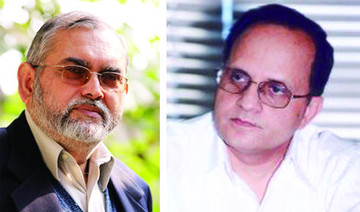WASHINGTON: An executive order by US President Donald Trump to suspend refugee admissions has magnified the fears of one Afghan American soldier who has long been worried about the fate of his sister in Kabul.
The soldier is afraid his sister could be forced to marry a Taliban fighter or targeted by a for-ransom kidnapping before she and her husband could fly out of Afghanistan and resettle as refugees in the US
“I’m just thinking about this all day. I can’t even do my job properly because this is mentally impacting me,” the soldier with the US Army’s 82nd Airborne Division told Reuters on Tuesday. He spoke on condition of anonymity for security reasons.
Almost 200 family members of active-duty US military personnel approved for refugee resettlement in the US will be pulled off flights between now and April under Trump’s order signed on Monday, according to Shawn VanDiver, head of the #AfghanEvac coalition of veterans and advocacy groups, and a US official familiar with the issue.
They are among nearly 1,560 Afghan refugees who will be taken off flight manifests, according to VanDiver and the official.
They said the group includes unaccompanied children and Afghans at risk of Taliban retaliation because they fought for the US-backed government that fled as the last US troops withdrew from the country in August 2021 after two decades of war.
The UN mission in Afghanistan says the Taliban have killed, tortured and arbitrarily detained former officials and troops. It reported in October that between July and September, there were at least 24 cases of arbitrary arrest and detention, 10 of torture and ill-treatment and at least five former soldiers had been killed.
The Taliban instituted a general amnesty for officials and troops of the former US-backed government and deny accusations of any retaliation. A spokesman for the Taliban-backed government did not immediately respond to questions about fears of retribution against those families awaiting relocation.
A UN report in May said that while the Taliban have banned forced marriages, a UN special rapporteur on human rights remained concerned about allegations that Taliban fighters have continued the practice “without legal consequences.”
A crackdown on immigration was a major promise of Trump’s victorious 2024 election campaign, leaving the fate of US refugee programs up in the air.
His executive order, signed hours after he was sworn for a second term, said he was suspending refugee admissions until programs “align with the interests of the United States” because the country cannot absorb large numbers of migrants without compromising “resources available to Americans.”
DESTINY UNCLEAR
“It’s not good news. Not for my family, my wife, for all of the Afghans that helped us with the mission. They put their lives in danger. Now they will be left alone, and their destiny is not clear,” said Fazel Roufi, an Afghan American former 82nd Airborne Division soldier.
Roufi, a former Afghan army officer, came to the US on a student visa, obtained citizenship and joined the US Army. He witnessed the chaotic Kabul airport pullout as an adviser and translator for the commanding US general, and he himself helped to rescue Americans, US embassy staff and others.
His wife, recently flown by the State Department to Doha for refugee visa processing, now sits in limbo in a US military base.
“If my wife goes back, they (the Taliban) will just execute her and her family,” said Roufi, who retired from the US Army in 2022.
The active-duty 82nd Airborne soldier said he harbors similar fears, adding that his sister and her husband have been threatened with kidnapping by people who think they are rich because the rest of the family escaped to the US in the 2021 evacuation.
“She has no other family members (in Afghanistan) besides her husband,” he said.
Trump’s order has ignited fears that he could halt other resettlement programs, including those that award special immigration visas to Afghans and Iraqis who worked for the US government, said Kim Staffieri, executive director of the Association of Wartime Allies, a group that helps Afghans and Iraqis resettle in the United States.
“They’re all terrified. The level of anxiety we are getting from them, in many ways, feels like the lead-up to August 2021,” she said, referring to the panic that prompted thousands of Afghans to storm Kabul airport hoping to board evacuation flights.
Another Afghan American, who caught a flight with the US troops for whom he translated and joined the Texas National Guard after obtaining his green card, said his parents, two sisters, his brother and his brother’s family had been scheduled to fly to the US within the next month. He had found accommodations for them in Dallas.
“I cannot express in words how I feel,” said the Afghan American who asked his name be withheld out of fear for his family’s safety. “I don’t feel good since yesterday. I cannot eat. I cannot sleep.”





























